 Petzlover
Petzlover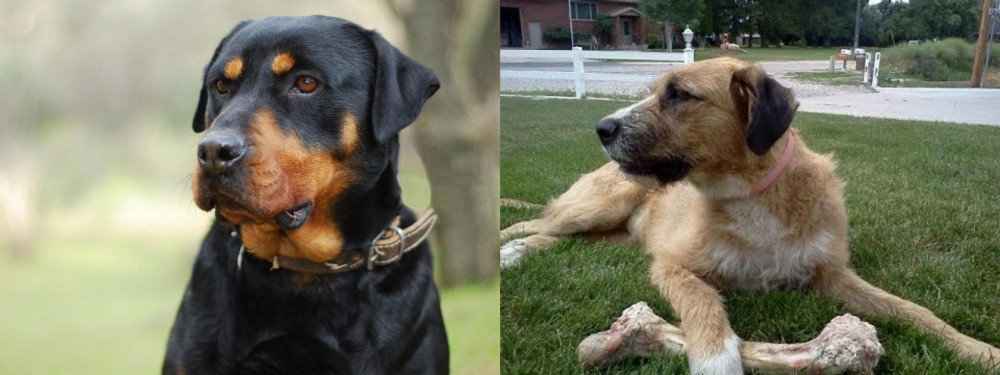 Rottweiler is originated from Germany but Irish Mastiff Hound is originated from United States. Rottweiler may grow 22 cm / 8 inches shorter than Irish Mastiff Hound. Rottweiler may weigh 14 kg / 30 pounds lesser than Irish Mastiff Hound. Both Rottweiler and Irish Mastiff Hound has almost same life span. Both Rottweiler and Irish Mastiff Hound has same litter size. Rottweiler requires Low Maintenance. But Irish Mastiff Hound requires Moderate Maintenance
Rottweiler is originated from Germany but Irish Mastiff Hound is originated from United States. Rottweiler may grow 22 cm / 8 inches shorter than Irish Mastiff Hound. Rottweiler may weigh 14 kg / 30 pounds lesser than Irish Mastiff Hound. Both Rottweiler and Irish Mastiff Hound has almost same life span. Both Rottweiler and Irish Mastiff Hound has same litter size. Rottweiler requires Low Maintenance. But Irish Mastiff Hound requires Moderate Maintenance
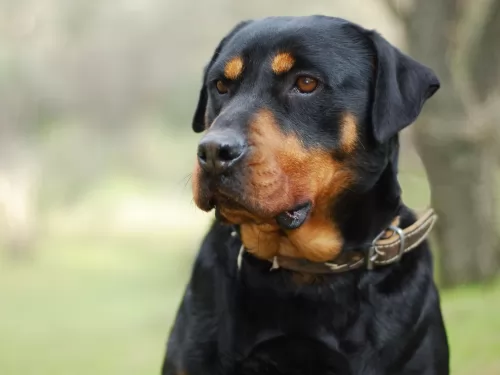 It is beleived to be the Rottweiler has been developed from the Roman cattle dogs. The Roman empire made a camp in a place at Germany in 74 AD. The area was called as 'das Rote Wil' and later as 'Rottweil'. In the middle ages Rottweiler was used in bear hunting and as a cattle dog. In 1899 the International club for Leonbergers and Rottweiler dogs was formed in Germany. In 19th century due to set in of railways the cattle was moved by railways and the need for the breed declined. When the world war was set in there came a heavy demand for police dogs. Rottweilers played a major role in first and second world war.
It is beleived to be the Rottweiler has been developed from the Roman cattle dogs. The Roman empire made a camp in a place at Germany in 74 AD. The area was called as 'das Rote Wil' and later as 'Rottweil'. In the middle ages Rottweiler was used in bear hunting and as a cattle dog. In 1899 the International club for Leonbergers and Rottweiler dogs was formed in Germany. In 19th century due to set in of railways the cattle was moved by railways and the need for the breed declined. When the world war was set in there came a heavy demand for police dogs. Rottweilers played a major role in first and second world war.
In 1921 many German Rottweiler clubs joined together to form ADRK, which is Allgemeiner Deutscher Rottweiler Klub. This is said to be the home club of Rottweiler. American kennel club recognised them in 1931. They become 9th most popular breed in America in 2013.
 The Irish Mastiff Hound is a huge dog – a mix of the English Mastiff and the Irish Wolfhound.
The Irish Mastiff Hound is a huge dog – a mix of the English Mastiff and the Irish Wolfhound.
Both of these dogs have been around for a long time and actually have ancient histories. The Mastiff for instance has origins that date back to ancient times in China, while the Irish Wolfhound has origins that date far back to 391 AD.
Today this dog is regarded as an excellent companion for any home.
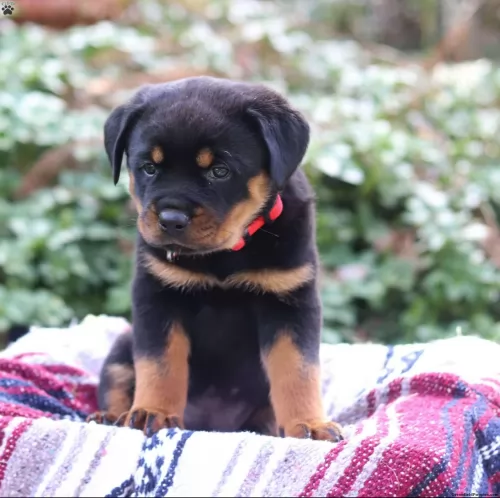 Rottweilers are good natured, obedient and are very much eager to work. They are calm, confident and an excellent watchdog. They will not make friends immediately. Rottweilers can be said as an all purpose dog since they are suitable as companion and watch dog as well. He is good in herding and guarding as genital feature. Rottweiler must be trained from its younger stage and should not be hit while training. They have high energy level and thus they are interested in doing work if properly trained. There are more possibilities of biting the strangers because of watchdog tendency.
Rottweilers are good natured, obedient and are very much eager to work. They are calm, confident and an excellent watchdog. They will not make friends immediately. Rottweilers can be said as an all purpose dog since they are suitable as companion and watch dog as well. He is good in herding and guarding as genital feature. Rottweiler must be trained from its younger stage and should not be hit while training. They have high energy level and thus they are interested in doing work if properly trained. There are more possibilities of biting the strangers because of watchdog tendency.
They are very good in herding sheeps as they have a natural gathering style. They are clever and adjusts the barking sound according to the situation. While herding they used to prove the leadership by selecting the dominant one in the flock and challenging it. If they were made to watch a same flock of cattle regularly, then they will develop a bond with them and will be affectionate with them as long as the cattle obeys its commands.
 This is a large crossbreed which can stand at 85 to 91 cm in height and weigh in the region of 47kg to 74kg.
This is a large crossbreed which can stand at 85 to 91 cm in height and weigh in the region of 47kg to 74kg.
He essentially has the short, smooth coat of the Mastiff but other dogs may well inherit the longer, more wiry coat of the Wolfhound. Coloring of the coat can be quite varied and can be brown, grey, white, tan or black. Some dogs take more after the Mastiff while others have more Wolfhound characteristics. They have a large head, some have a somewhat wrinkly face because of the Mastiff side, the ears are fairly small and floppy and the tail is long.
Even though they're so huge, these are easy going dogs that are able to fit in well with most human families. Described as gentle giants, they are loving, loyal, easy-going, even-tempered and eager to please.
The Irish Mastiff does well in the city or in the country because he isn't particularly active and will be happy to have a comfortable spot to lie close to you, however with such a large dog, you will certainly need a garden.
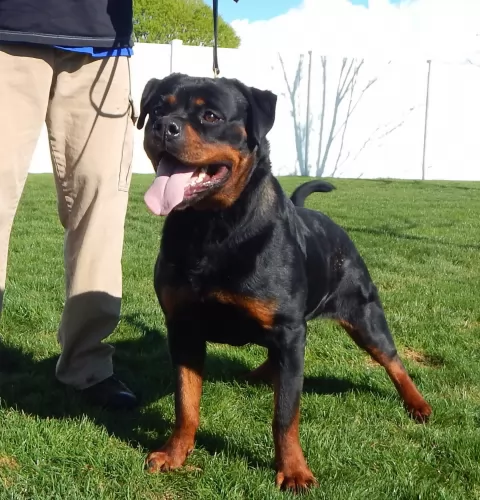 They are friendly with children and enjoy the company with them. But it is not advised to leave them with children without adult supervision.
They are friendly with children and enjoy the company with them. But it is not advised to leave them with children without adult supervision.
Rottweilers do not make friends immediately but take time to know about new people. He is an excellent watchdog. Males are quiet in nature but are watchful and females are more affectionate and obey some more. A good training is required for them to obey your orders.
They are not good for apartment life and thus a fenced back yard will be better for them to play and spend the energy. They require companion and will be happy to walk around with you. Hot weather will be some what better for them when compared with cold.
Rottweilers are easy to train because of their high intelligence. The training should be started in their young stage to have best results. They should not be dominated but treated kindly with understanding. They should be comfortable with the surroundings and people. Giving him a reward for training will make him interested in doing it. If he does a mistake then he should not be hit, so that he may get fear and loss his interest in doing it. Punishments will never work for them but rewarding will make him encouraged. Simple commands such as sit and stand shall be taught to them.
 Your big Irish Mastiff Hound is cool, confident and calm. He isn't particularly energetic and as long as he gets a nice walk as well as some mental stimulation, he'll be happy, wanting to spend a good part of the day lying close to where you are.
Your big Irish Mastiff Hound is cool, confident and calm. He isn't particularly energetic and as long as he gets a nice walk as well as some mental stimulation, he'll be happy, wanting to spend a good part of the day lying close to where you are.
Socialization and training will be good for him and he learns easily. He is just a big gentle giant who promises to make you a wonderful canine friend.
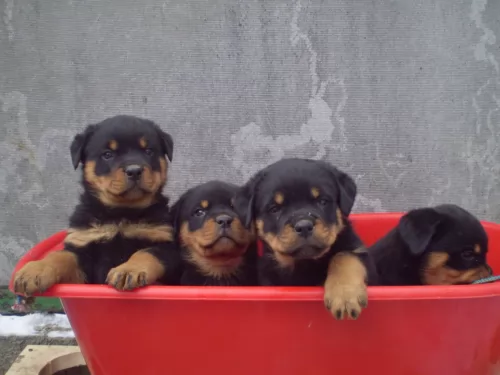 The health issues affecting the eyes of them are Cataract and Progressive Retinal Atropy. Health problems common in their joints are Hip Dysplasia, Elbow Dysplasia and Panosteitis. They also have chances to get circulatory system problems like Aortic Stenosis and Von Willebrand's Disease. Other common health problems in Rottweiler are Bloat and Cancer.
The health issues affecting the eyes of them are Cataract and Progressive Retinal Atropy. Health problems common in their joints are Hip Dysplasia, Elbow Dysplasia and Panosteitis. They also have chances to get circulatory system problems like Aortic Stenosis and Von Willebrand's Disease. Other common health problems in Rottweiler are Bloat and Cancer.
Mostly people think that Rottweilers don't shed but they are short haired dog and sheds more. They are having double coat that is undercoat and topcoat. The undercoat is softer and protects them in winter and topcoat is rougher and visible. It is said that they will shed in spring and winter seasons. Shedding can be reduced by brushing them.
 Many people find giant dogs irresistible because they're usually gentle, patient and loving. However, it is their very size which makes them more prone to certain health concerns and gives them a shorter lifespan.
Many people find giant dogs irresistible because they're usually gentle, patient and loving. However, it is their very size which makes them more prone to certain health concerns and gives them a shorter lifespan.
It is why it is so important to ensure you feed your pet a healthy diet to ward off illness. A large dog like the Irish Mastiff doesn't have a particularly long lifespan, and with good care he can get to 9, 10, 11, 12 years of age.
This condition is more common in large dogs and it can lead to joint degeneration, arthritis and pain. Your pet may even be reluctant to get up and greet you when you come home which can be very sad. Vet intervention will certainly be required.
This heart disease is commonly seen in large dog breeds where the heart becomes weak so that it can't pump blood throughout the body. Coughing, difficulty with breathing, weakness and lethargy are just some of the symptoms of this disease and will also require veterinary intervention.
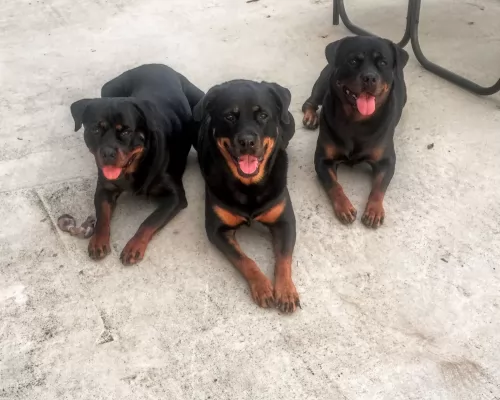 Rottweiler puppies should be given a diet which has protein, carbohydrates and fats. They need different diets in their growing stages. They can be given chicken with bones and vegetables for 4 days in a week. Beef with vegetables can also be given. When feeding them red meat a raw meaty bone can also be included. Fish oil can be given such that starting with 1000 mg and making it to 3000 mg in a time of two weeks.
Rottweiler puppies should be given a diet which has protein, carbohydrates and fats. They need different diets in their growing stages. They can be given chicken with bones and vegetables for 4 days in a week. Beef with vegetables can also be given. When feeding them red meat a raw meaty bone can also be included. Fish oil can be given such that starting with 1000 mg and making it to 3000 mg in a time of two weeks.
High calories of protein should be provided to them to meet their energy requirements. While buying commercial food it should be checked for the main ingredient to be meat. Protein levels should be more from animals than vegetables. High quality dairy products should be included. Food should not have low quality flavours and preservatives. Healthy fat is necessary for their skin and coat. If these fats are not provided it will cause dandruff and itchy skin.
Brushing them weekly once is recommended for their coat and skin. Buying the puppy from reputable breeder will be better. Vaccinations and preventive medicines should be given on right time. Spaying and Neutering should be done to avoid unwanted pregnancy. High quality diet should be maintained. Making them to bath once in a week is advisable. Nails should be trimmed once in every two weeks.
Rottweilers like to chase something and Laser pointer will be a good game for them. It will make them busy and also entertain us. But it should be on a limit and they should not get bored. A treat or toy can be hided and they can be made to find it. A bottle should be filled with water and frozen. The frozen bottle can be given to them for playing. In summer time it will make them very happy to play with it. A ball or toy can be thrown and they can be made to fetch it. Walking them is also a good exercise.
 He has a short coat, and grooming of this laid-back dog will include brushing him twice a week, trimming his nails and making sure that you check inside his ears for ear infection.
He has a short coat, and grooming of this laid-back dog will include brushing him twice a week, trimming his nails and making sure that you check inside his ears for ear infection.
Large dogs have special nutritional needs, particularly because they are more prone to illnesses such as hip dysplasia. You want to make sure that the foods he eats are rich in Omega-3 fatty acids, glucosamine, chondroitin, amino acids and antioxidants because these will ensure proper joint health.
You've got to be careful what you feed a large breed dog because of the weight management issue too. Excess weight puts stress on the joints and promotes the development of osteoarthritis. Speak to your vet about portion control and meat protein for your pet and how to ensure excellent nutrition to avoid common dog illnesses.
Fresh, cool water needs to be available to your pet every minute of the night and day.